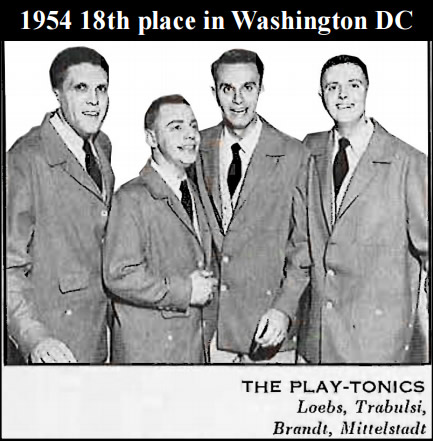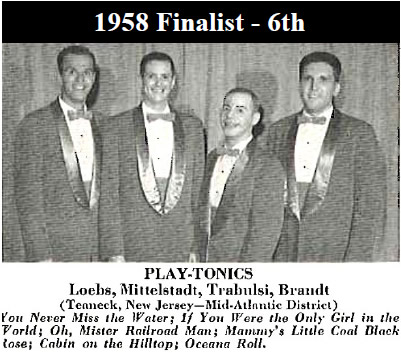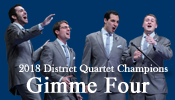The members were Gene Loebs (Tenor), Dave Mittelstadt (Lead), Vic Trabulsi (Baritone) and Ralph Brandt (Bass). Replacement bari Jerry Smith joined the quartet in 1960.
Sadly, four of the five members of the Play-Tonics have passed away. Bass Ralph Brandt (86) is thankfully still with us. He proudly claims the title of “Last Living Play-Tonic.”
It was 1956 when they ended up an insurmountable 462 points behind the international champion quartet juggernaut, The Confederates,
and were awarded the silver medal.
But that's not the Play-Tonics' story. They were MUCH more than just a “second place” quartet.
In looking at their International competition history you will find they made a quick climb into the
top five with a HUGE jump from their 1955 16th place to the second place silver medals in 1956.
Then they had a slow fall, but remained in the top ten for the next four years.
During their history they BEAT, head to head, EIGHT future champs.
It was Dave who came up with the name Play-Tonics. They seemed to lean toward a unique sound and exclusive selection of songs.
They weren't always strictly “barbershop” so this allowed them to “play” around with different chords and distinctive arrangements
The first song they learned was in 1954 in Vic’s Bergenfield, New Jersey apartment, “If You’re Irish.”
They had a natural blend and didn’t have to work on it - had a great lead/bass match.
“All we had to do was to learn the music. We were told that a natural blend 'made champions'. We were pretty happy about the sound we could make.”

Their very first competition was in the Mid-Atlantic District’s International qualifying contest held in York, PA.
They enjoyed a quick rise to “stardom.” They were in immediate demand and always had a full schedule of shows, including headlining many chapter shows.
The Play-Tonics had a special skill. They were able to get totally lost in their songs during a performance.
They could transport themselves into the message and the story and the audience recognized this.
Vic stood out and was the “personality” of the Play-Tonics. He was enthusiastic, happy, and always had a smile on his face.
Dave was the quartet leader and introduced each song.
In July of 1959, they had the distinct honor of recording their very own record for a major label - Warner Bros. Records.
This WAS a big deal as it was the home of several stars including Spike Jones and Bob Newhart among others.
The Play-Tonics session (may have been done in two) was a special experience.
They sang all the songs they knew, most only once. Theirs was the first barbershop quartet recording in a brand new thing called “Hi-Fi.”
Of course, they also appeared on the Decca Records contest recordings. Both their Warner Bros. LP and convention LPs were in everyone's record collection at the time.
Many learned their songs off these records and their song choices were popular among other quartets and their fans.
By 1956, the Play-Tonics got serious about competition and did what the other serious quartets did - they rehearsed more, got a little coaching, and made some adjustments to improve.
Their one-and-only coach was Manhattan chapter member Ed Hubbard. Ed arranged their versions of Peggy O'Neill and Come A -Courtin' Corabelle. He didn't need to help coach the sound, it was already there.
He helped with some technical aspects like attacks and releases and helped hone them into a “Singin’ Machine.”
So, by convention time, they went to the contest and left the families at home. In order to WIN, the quartet decided to isolate themselves in one hotel room (just as champions did),
perfect their contest songs (just as champions did), and work with some top coaches (just as champions did).
Despite the extra coaching and extra work, The Play-Tonics were the HIT of the convention. No one expected them to be this good after placing just 16th the year before.
This was the Play-Tonics THIRD International and they hadn't cracked the top ten yet.
But when the audience (and the quartet) heard The Confederates in Minneapolis they KNEW they had heard the best.
“We were backstage with the Confederates and we were rooting for them. Once you win, you can't compete anymore. That's where the fun comes in!”
Minneapolis Was “NO FUN”
The quartet pretty much MISSED the convention while solely focused on doing their best, which they did.
Of course they were THRILLED with second place! Jumping up to the silver medals was a surprise.
Afterward, there were many who encouraged them to work harder. “Maybe Next Year” was the most popular pat on the back.
In those days the International Headquarters handled all the bookings of the champion quartets.
They also had a lot of dates the quartet was REQUIRED to do as the Society's worldwide ambassadors.
Each of the Play-Tonics had young children, jobs to attend to, and wives. They wanted to retain CONTROL of their quartet schedule and not allow it to be dictated by someone else.
This fear of being out of control was really one of the reasons they collectively chose to back off the drive to be first.
They felt they were good enough and if they won it would be fine, but they wanted to have FUN and not let this “go for the gold” consume the quartet.
The next year, in 1957 in Los Angeles they decided to do things a lot differently. They brought their wives out to sunny California and decided to enjoy themselves.

They enjoyed the convention, saw more friends than they ever imagined and sang LOTS of tags. And, without going overboard with the seriousness and extra work,
came in FIFTH PLACE and took home their second medal.
After the convention, they went to Disneyland! Ralph borrowed their host's car and he and Ann took a road trip and drove eastward through the desert to the Salton Sea.
Everyone had a BLAST!
THIS was more like “Barbershopping!”
They would continue to qualify for Internationals and place high but never win... and they were perfectly OK with that.

This is an exerpt from an article written by Grady Kerr, in the July 2016 edition of “PRESERVATION”.
Click to see the full edition.
|





